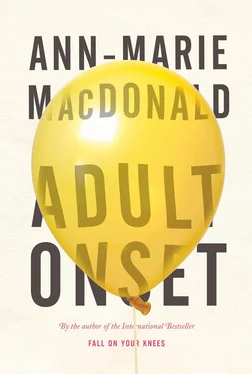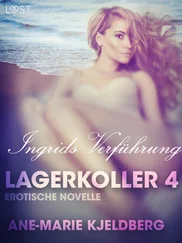“That’s just one event.”
“Yes, but it sets up all the others.”
“But you already know there was ‘repeated trauma,’ ‘neglect’—”
“The balcony is something I can hang on to — literally, okay? It’s something I can point to, it’s a picture, I can frame it, I can say, ‘See? That’s what happened. My mother didn’t do the first one.’ ”
“The first what?”
“Assault! Accident, whatever.”
“You’re fixated on your arm, when it’s just part of—”
“It’s the key to the whole thing.”
“It’s just one aspect of a pattern of—”
“How can you not know it matters?! I’m talking about a series of events, you’re talking about a disco ball.”
“A ‘disco ball’?”
“ ‘Aspects,’ little bits, shiny busted mirror spinning on the ceiling—”
“I don’t understand—”
“I don’t want the everythings , I just want to get my hands on a something!”
Hil’s voice is calm. “Even if you could prove your mother broke your arm in a fit of rage, you’d justify it with how much she suffered.”
“My mother did suffer. I don’t know if we can actually imagine what she suffered.”
“I don’t have to imagine it. I live with you.”
“Is that supposed to be funny?”
“I’m sorry, I mean I live with some of the results of how your mother dealt with her suffering. And I’m not talking about one event. So you have to decide. Do you want to come out of the closet? Or do you want to prove that it wasn’t so bad by raising your own children the same way?”
“Hil? … I’m afraid.”
“What are you afraid of?”
I’m afraid of my hands .
In the aftermath of the swirl, a seared silence. But not stillness. The air is in motion. It is as if sound had just now been torn from the room. What remains is the aftershock of sound. The air throbs. Thickens, takes on the sheen of a fresh bruise. What has just happened? Empty does not equal safe. Quiet does not equal peaceful. Something has retreated. It will be back, you cannot know when. And strangest of all? There is no one in this picture. Where is the Me?
“I’m afraid that it’s true. And I’m afraid that it isn’t.”
“Sweetheart. It’s right in front of you.”
She looks at her face in the big black window. Shock of white, gaunt and shadowed. Like an X-ray.
“Mary Rose? What you’re telling me is very sad, I’m sorry.”
“How was your preview?”
“We got a standing ovation.”
“That’s great.”
“Mary Rose—”
“I’ll get some friends over tomorrow, I’ll get some help. Don’t worry about the kids.”
“I’m more worried about you.”
“I’m fine.”
“I love you.”
“Love you too, good night.”
“Mister?”
“I won’t hurt them.”
“Don’t hurt yourself.”
“I promise.”
•
She hangs by the wrists, looking down over the bright green grass where her father is playing catch. If he looks up, what will happen? What will she have to feel? What will she have to know?
•
She goes upstairs and looks into Maggie’s crib. Bone cysts are not genetic, but they are hereditary. Today she did not pass them on to her child. What about tomorrow? She can get help with her anger. She can get help sorting out what happened and did not happen to her and who’s on first, the chicken or the egg? She can hang on to the balcony for dear life until she grows strong enough to haul herself back to safety. But, she wonders, is there a surgical procedure to open the heart? Because right now, she would give anything to be able to feel — without the kick-start of anger — the love she knows she has always had for her child. She can see this love. Behind glass. Sleeping. With a fragment of poisoned apple lodged in its mouth.
Swerve
At eight a.m., she calls Sue.
“Want to get together with the kids? … No, everything’s fine … Exactly! … Ha-ha … Perfect, see you then.” Sue has seen through her already, and this early morning shout-out just confirms what a mess she is. What if the unthinkable occurs and she cries in front of Sue? But Sue is as close as she can get to Hil right now, and she needs a Hil.
She lets Maggie colour in her datebook but draws the line at handing over her entire bag. She leaves the breakfast mess and gets down on the floor with Matthew and a mountain of Lego. Today is a different world. A house fell on her last night. Her whole mother fell on her, yet here she is playing in the rubble, and wearing a macaroni necklace. She sings, “ ‘It’s a beautiful day in this neighbourhood, a beautiful day for a neighbour …’ ” She is pain free and, not exactly dizzy, a bit off to one side — as though she were sticking out of herself at an angle. Normally she would try to stuff herself back in, but today she is going to let it be.
Matthew takes a block from Maggie. Maggie hits him with the datebook. He screams. Mary Rose makes peace without yelling — without wanting to yell. She has a sense of reprieve. Something has withdrawn … The catastrophes flash in her periphery just as they did yesterday, but depleted of force — perhaps she could learn to live with them the way some people learn to live with voices. Indeed, her sobriety is intoxicating as she goes about motherproofing her home.
At 8:10, she calls Candace. “Can you do Monday morning?”
“I’ve got my cake decorating class.”
“Okay, thanks.”
“Are you stuck?”
“No, not at all. Yes. I am stuck.”
“I’ll bring Maggie, she’ll enjoy it.”
If the thing comes back, the children will be safe. It is as though she were getting her affairs in order in the event of her sudden disappearance.
What about tomorrow? She can bring the children to the train station for the hour-long stopover, her parents will enjoy that, and then …? The vacant sun-pressed plain of a Sunday afternoon … Think: you know hundreds of people, Toronto is seething with family entertainment, go paint some clay pots, jump on a trampoline in a cavernous facility north of the 401. Or maybe just a quiet day at home with the kids—
“Give it back!”
“No!”
“Mumma-a-a-a!”
She calls Gigi and leaves a message. “Hi, want to go to the zoo with me and the kids tomorrow afternoon? And then stay for supper, actually can you come for supper tonight too?” Does that sound like a cry for help? She recalls it is all of 8:15 of a Saturday morning and hopes Gigi has her ringer turned off — unless she has spent the night at the home of her latest “lady friend.” The doorbell rings just as she hangs up. Daisy does not go crazy — tuckered, perhaps, from her crib-side vigil. Who can it be at this hour of the morning? Animal Control? She peeks through the window. Gigi is standing on the porch with a pasta pot and her motorcycle helmet. Mary Rose opens the door.
Gigi is built something like a pasta pot herself. Her coal-black curls are slicked fresh from the shower, she sports a leather jacket, a vintage bowling shirt and her signature sly smile. “I was in the neighbourhood with a batch of meatballs on the back of my bike, so I thought I’d drop by, see who’s hungry.”
Maggie tackles Gigi’s legs, Daisy lumbers from the landing, Matthew saunters up and informs his godmother with professorial gravitas , “I have a helicopter that goes underwater and fights snakes.”
“Awesome.”
“Here, let me take that,” says Mary Rose.
Gigi is born and bred Toronto, a genuine St. Clair Avenue Eyetalian. She called herself a dyke back when you could still get beaten up for it on a Friday night, she called herself a dyke when you could be censured for it by lesbian feminists, she called herself a dyke when lesbian feminists reclaimed the word, and she still calls herself a dyke now that “queer” has rendered the term quaint. “I’m a dykosaur,” she likes to say.
Читать дальше












